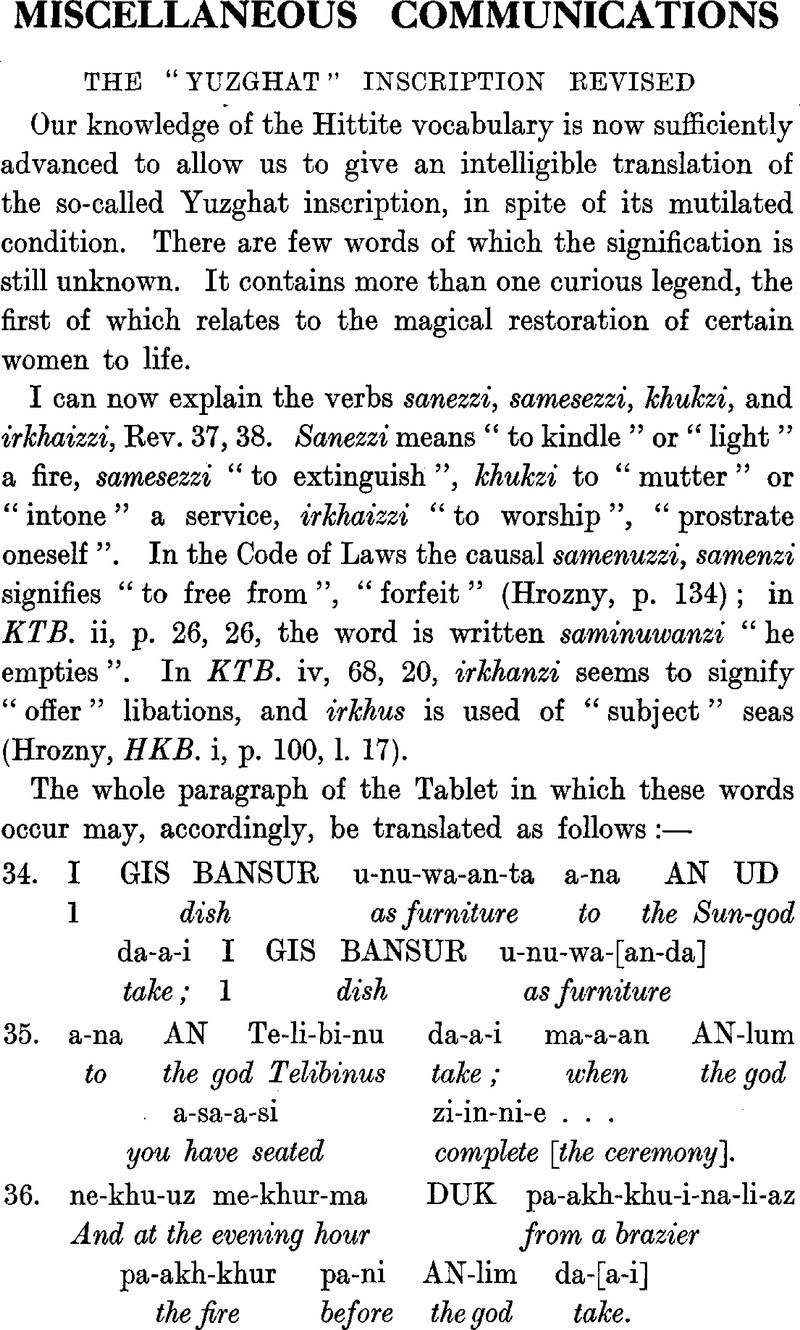No CrossRef data available.
Published online by Cambridge University Press: 15 March 2011

page 646 note 1 Assyrian labanu.
page 647 note 1 Tinut is replaced by the Ass. izbat in I. 31.
page 647 note 2 The causative of khad- “to bring” ; khaddai, KTB. ii, 52, 17 ; khaddinzi, KTB. iv, 60, 9.
page 647 note 3 Khuwanti, like the plural khuwandus “winds” or “clouds”, is the participle of khûwar “to run away”, “move quickly”.
page 647 note 4 It would appear from 1. 36 that the brother was Khasammilias, an early Hittite king, whose name is identical with that of the Greek Kasmeilos, the leader of the Kabeiri.
page 647 note 5 Or “offers service”, as in the Legal Code, where it is used with aruwan.
page 647 note 6 Cf. KTB. iv, p. 80, 1. 13 : nussissan uêllus khalissi asaunissi sublessi lê luluwaitta “for him the grass grows not for his ox-stall, his sheep-fold, his stable”. In the next sentence uelkuwan is probably a scribal error for uelluwan, and we should read : istu ASAG SU-massi-kan aggalit uelluwan lê uizzi “so that from the field for his hand with the mattock (?) there comes no crop of grass”. Aggali may be borrowed from Ass. ; in KUB. iii, p. 94, 21, aggantas khûlali is explained by the Ass. ekim appanu “shaft (?) of the spindle” (with appanu cf. the Tel el-Amarna appanannu). Aggantas here has no connexion with agganzi (Arzawan aggas) “he is loyal”. Uellu occurs again in KTB. iii, p. 41, 23 : bargaus KHAR-SAKZUN lântat khallûes khâries lântat AN Tessub-as uellu lântat “the high hills Tessub bedews, the deep valleys he bedews, the grass he bedews”.
page 648 note 1 Cf. paiskattaru, KUB. iv, p. 2, 40, where it is followed by the ace. wakhan (“circle” ?).
page 648 note 2 Numastan is an adj. agreeing with GU-UN. A verb numaizzi “ he wipes” occurs in KTB. v, 2, 26. Perhaps we have to supply “If [there are mines]” at the end of the preceding line, and interpret numastan (or nu-wastan ?) as “half” or “quarter”.
page 649 note 1 I imagine that wa is the Assyrian and not the Hittite copulative, since it is attached to the Assyrian phrase biet îddin. The text would appear to have been translated from an Assyrian original. The “Sungod” seems to be the king.
page 649 note 2 Sankheskit is rendered by the Ass. itekhkhi, KUB. i, 37, 22, and the Legal Code shows that it had the sense of “seeking” or “visiting”, uemiya—signifying “to find”.
page 650 note 1 Tuêggas is allied to tugganza “partner”, tuqqat “made deputy”, KTB. iv, 62, 18.
page 649 note 2 Aanta has the same root as antiyantas “nearest relative”, KUB. ii, 43, 39. Cf. antassan, KUB. ii, 35, 11.
page 649 note 3 Iyasi-nu-kitta “caused to be made” signifies “were born” (KTB. v, 55, 25) ; cf. iyada, Ass. khengalli, “abundance.” Friedrich has pointed out that gimras is explained by the Ass. tsêru, Sum. EDIN.
page 649 note 4 Terib is borrowed from Assyrian.
page 651 note 1 The “Sun-god” Telibinus becomes the Hittite king.
page 649 note 2 Bissatti may be a contracted form of the verb bessia- “drive away”.
page 649 note 3 Kîni seems to be from kî “deposit”, the signification of the passage being: “For 1 year [the property goes] to the Chief for a possession. Then thou wilt have (it). For 1 year the brothers of Khasammilias are [the owners ?].”
page 652 note 1 From the same root as damêda, Ass. dussu, “fat,” “abundant.”
page 652 note 2 This passage is unintelligible to me and I suspect an error in the text. The form in -us denotes the acc. pl., and kûssa ought to be either kûs “these” or kûssan “wages”, “dowry”.
page 653 note 1 This can hardly be a proper name. It must, however, denote the reciter of the legend : was she the mother of Khakhkhimas ?
page 653 note 2 In KUB. iii, p. 103, S, mugauwas is translated tazimtu “dirge”. Cf. KUB. ii, p. 3, 10: AN-MES-KA mugai “thy gods she invoked”.
page 653 note 3 In the Legal Code sakuwân means “equivalent”, “in full”.
page 653 note 4 In KTB. i, p. 85, 11, compared with p. 84, 9 and 10, ligies is terdu and gabidu “the liver”, while according to 85, 11, lêgan signified [zum]ru “body” ([tera]nu = li-e-gan, [zum]-ru = IM-TE-AN “ditto”).
page 653 note 5 According to Rev. 34 the offerings were made to the Sun-god and Telibinus ; the preliminary history would consequently have been recited in their honour.